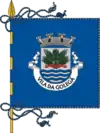Golegã
Golegã (Portuguese pronunciation: [ɡɔlɨˈɣɐ̃] (![]() listen)) is a small municipality in Santarém District in Portugal. The population in 2011 was 5,913,[1][2] in an area of 84.32 km².[1][3]
listen)) is a small municipality in Santarém District in Portugal. The population in 2011 was 5,913,[1][2] in an area of 84.32 km².[1][3]
Golegã | |
|---|---|
 Flag  Coat of arms | |
 | |
| Coordinates: 39°24′N 8°29′W | |
| Country | |
| Region | Alentejo |
| Intermunic. comm. | Lezíria do Tejo |
| District | Santarém |
| Parishes | 3 |
| Government | |
| • President | Rui Manuel Lince Singeis Medinas Duarte (PS) |
| Area | |
| • Total | 84.32 km2 (32.56 sq mi) |
| Population (2011[1]) | |
| • Total | 5,913 |
| • Density | 70/km2 (180/sq mi) |
| Time zone | UTC±00:00 (WET) |
| • Summer (DST) | UTC+01:00 (WEST) |
| Local holiday | Ascension Day (date varies) |
| Website | http://www.cm-golega.pt |
The present Mayor is Rui Manuel Lince Singeis Medinas Duarte, elected by the Socialist Party. The municipal holiday is Ascension Day.
Parishes
Administratively, the municipality is divided into 3 civil parishes (freguesias):[4]
- Azinhaga
- Golegã
- Pombalinho
Population
| Population of Golegã municipality | ||||||||
|---|---|---|---|---|---|---|---|---|
| 1801 | 1849 | 1900 | 1930 | 1960 | 1981 | 1991 | 2001 | 2011 |
| 2452 | 2866 | 5694 | 6325 | 6150 | 5963 | 6072 | 5710 | 5913[1] |
Historical sights
The main historical sight of Golegã is its main church Igreja Matriz da Golegã, built in the early 16th century in Manueline (Portuguese late Gothic) style. The remarkable main portal and the ribbed vaulting inside the main chapel are its most important artistic features.

Near Golegã village is located the Quinta da Cardiga, a manor house with its origin in a 12th-century donation to the Knights Templar. Originally the site of a castle, the property was remodelled in the 16th century into a Renaissance rural palace.
Personalities
The winner of the 1998 Nobel Prize for Literature, José Saramago, was born in the parish of Azinhaga in 1922.
The distinguished goalkeeper Manuel Bento, having 63 caps in the national team to his credit, including games at the UEFA Euro 1984 and 1986 FIFA World Cup final tournaments, was born in the Golegã village in 1948.
Horse capital
Golegã is considered the capital of the horse (Capital do Cavalo), and it has been the site for the gathering of breeders since at least the 18th century. Two fairs take place every November in Golegã: The Feira Nacional do Cavalo (National Horse Fair) and the Feira Internacional do Cavalo Lusitano, dedicated to the Lusitano horse.
References
- including the parish Pombalinho, that changed from the municipality of Santarém to Golegã in 2013
- Instituto Nacional de Estatística
- "Áreas das freguesias, concelhos, distritos e país". Archived from the original on 2018-11-05. Retrieved 2018-11-05.
- Diário da República. "Law nr. 11-A/2013, page 552 53" (pdf) (in Portuguese). Retrieved 23 July 2014.
External links
- Municipality official website
- Feira da Golega.com
- (in French) Feira nacionale do cavalo (photo reporting)
- Photos from Golegã